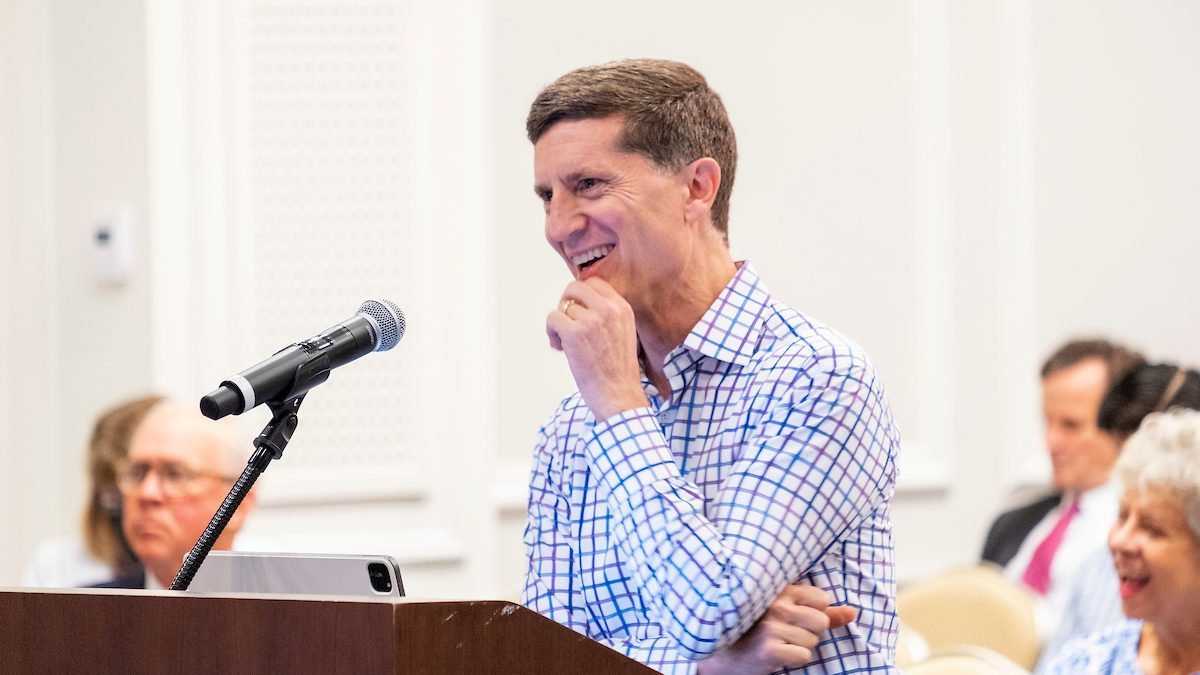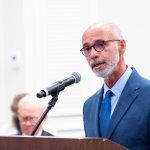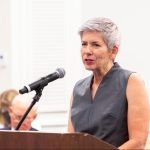BOT recap: Hip-hop diplomacy, lab school and free speech
At the July meeting, University Board of Trustees members heard about musical and educational outreach programs and addressed academic freedom and speech issues on campus.

In the featured presentation at the University Board of Trustees meeting July 28, trustees learned about a hip-hop diplomacy program founded at Carolina that has had bipartisan support through the last three presidential administrations.
The Next Level program, founded in 2013, has visited 40 countries on six continents and received more than $10 million in funding from the State Department. Its participants offer free workshops on music, dance, visual arts, entrepreneurship and conflict resolution to underserved communities from Argentina to Zimbabwe.
“Hip-hop diplomacy is a form of what’s called people-to-people diplomacy,” said program founding director Mark Katz, John P. Barker Distinguished Professor of Music in the College of Arts and Sciences’ music department. “Hip-hop is a global phenomenon. It has a much higher approval rating than the U.S. government.”
Next Level’s impact has also been felt at home, with hip-hop courses, research on cultural exchange and the creation of the Carolina Hip Hop Institute and the Beat Lab, a unique space on campus for musical creation.

K-2 lab school
School of Education Dean Fouad Abd-El-Khalick updated University Affairs committee members on the new Carolina Community Academy, a K-2 lab school opening in August within North Elementary School in Roxboro. A partnership of the University and Person County Schools, the academy is one of three to launch this year, with a total of 11 since a 2016 state law required the UNC System to establish lab schools.
“UNC-Chapel Hill is going to become a school district and has one school. Chancellor (Kevin M.) Guskiewicz now has another title: He’s head of a grade school. Congratulations,” Abd-El-Khalick said. The School of Education is leading the effort, but “the whole campus will be engaged” in the academy’s “whole education approach.” Faculty and staff from seven schools as well as other units will promote the learning and well-being of students and their families with robust wrap-around services and social-emotional support that are not always available in cash-strapped local school systems.
In a related request, the University received approval from the trustees to provide recruiting and referral incentives to eligible Carolina Community Academy employees that would match the incentives offered by the Person County school board.
Concerns about speech
An interdisciplinary faculty team presented its research on free expression and constructive dialogue in the UNC System to a joint meeting of the Strategic Initiatives and University Affairs committees. Based on surveys of 3,408 students at eight UNC System institutions, the report published online in May 2022 found:
- Course instructors encouraged participation from liberals and conservatives alike.
- Campuses do not consistently achieve an atmosphere that promotes free expression in classes where political topics are discussed.
- Students who identify as conservative face distinctive challenges.
- Students across the political spectrum want more opportunities to engage with those who think differently.
The report, presented by Timothy J. Ryan, associate professor of political science in the College of Arts and Sciences, and Mark McNeilly, professor of the practice of marketing at the Kenan-Flagler Business School, included recommendations for action by faculty, administrators and trustees adapted from a roadmap published by the Bipartisan Policy Center.
After the presentation, the board approved a resolution reaffirming its commitment to academic freedom as embodied in two historic documents from the University of Chicago, the 2014 Chicago Principles of academic freedom and the 1967 Kalven Committee Report on institutional neutrality.
After the vote was taken, Faculty Chair Mimi Chapman in her remarks to the University Affairs committee questioned why the two concepts were paired in the same resolution. “Your resolution puts two ideas together that perhaps need to be separated,” she said. She spoke about faculty members concerned about their academic freedom because their research dealt with controversial topics, including one who had been “recruited to lead a particular curriculum element that is now on hold.”
“We shouldn’t be hiding our light under a bushel,” Chapman said. The Kalven Report “says the university should never speak as an institution …. The report makes a compelling case for neutrality.”
“My goal was to show alignment between the trustees and the faculty,” said trustee Dr. Perrin Jones, who introduced the resolution. “No individual here should be fettered in terms of what they feel like they can and can’t say while they’re in a classroom or outside the classroom.” He included the Kalven Report to make it clear that “the person was speaking as an individual … and not as a representative of the University.”
In a second issue related to neutrality, trustee Teresa Artis Neal introduced a resolution that was approved by the board to have the chancellor develop a policy ensuring that student fees are appropriated in a viewpoint-neutral manner, according to state law. She said she wanted to elevate it to University policy so that no branch of student government could change it.
Foundations and highlights
In his remarks, Chair David L. Boliek Jr. said that the trustees need to ensure the University is “foundationally strong in a variety of ways,” listing these goals:
- A university that is fiscally strong.
- A campus culture that cultivates academic freedom.
- A diverse faculty mix, including viewpoint diversity.
- A modernized campus.
- Degrees that carry practical, real-world applications.
“I can’t think of anything more important for this University’s Board of Trustees to encourage, protect and defend than these five foundational underpinnings that I’ve outlined,” Boliek said.
In his remarks, Guskiewicz listed these four highlights:
- A record-breaking $1.2 billion in research award funding for the past fiscal year.
- The best year in giving to the University, with an unprecedented $798 million yearly total, up 33% from last year.
- Good news from state budget, including the 3.5% raise for state employees and funding for several capital projects.
- Making more resources available for students to help them cope with mental health concerns.

Raul Reis (Jon Gardiner/UNC-Chapel Hill)
Following his remarks, Guskiewicz introduced to the board two of Carolina’s newest deans, who made brief remarks. Raul Reis, formerly of Emerson College in Boston, became dean of the Hussman School of Journalism and Media on July 1. Beth Mayer-Davis of the Gillings School of Global Public Health was appointed dean of The Graduate School effective Sept. 1.
In other personnel news, the board approved the hiring of a new vice chancellor of communications. Kamrhan Farwell, vice chancellor and chief marketing and communications officer at the University of Missouri, will begin her new role on Sept. 26.

Beth Mayer-Davis (Jon Gardiner/UNC-Chapel Hill)
In other action, the board:
- Re-elected its current officers — Chair Boliek, Vice Chair John P. Preyer and Secretary Malcolm K. Turner — for another one-year term and elected Chris McClure assistant secretary.
- Extended the suspension of its regulation on honorary degrees.
- Heard an emergency preparedness presentation from the Office of Institutional Integrity and Risk Management that included the announcement of a “zombie festival” in September, a popular way emergency responders educate communities about how to handle unexpected events.
- Approved a lease for a 6,000-square-foot lab in the Research Triangle Park to be used for expedited research on per- and polyfluoroalkyl substances.
- Received updates on the University’s capital construction plans, development milestones and federal and state legislation that impacts campus.




